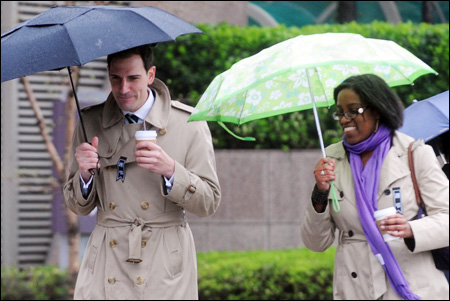
Despite efforts to stay warm, the 27-year-old has been struggling with cold from chilly weather for days.
''Warm rays of sunshine were usual at this time in previous years. But it's literarily freezing,'' she said sneezing.
The entire Korean Peninsula is shivering with a record-low spring chill ― the midday high temperature for Seoul recorded 7.8 degrees Celsius and 6.7 degrees for Daejoen, 170 kilometers south from the Seoul, Wednesday, the lowest for late April since 1908, according to the Korea Meteorological Administration (KMA).
The mercury across the country is forecast to do down further Thursday, with some snow expected in mountainous areas in Gangwon Province.
"The unusual chill is likely to continue until mid May,'' the state weather agency said, adding, ''Rain and accompanying wind made people feel much colder.''
The lowest mid-day temperature for late April in Seoul was 10.1 degrees Celsius, set on April 27, 1962.
An unusually high atmospheric pressure from north is to blame for the cold weather.
''The high atmospheric pressure over Siberia, with a lowest temperature of an estimated minus 30 degrees Celsius, has unusually extended its reach over the past two weeks. It now hovers just five kilometers above the peninsula,'' said Park Jung-kyu, a senior KMA official. ''It's keeping temperatures lower than usual.''
Park forecast the cold weather will continue until snow in Siberia begins to melt, which is around mid May.
The lower-than-usual temperatures have hit domestic agriculture and tourism as well as the clothing industry. Also the number of people with colds is on the rise.
Dr. Chung Min-kyu at the Severance Hospital in southern Seoul said the number of patients has doubled in recent weeks. ''Those vulnerable such as the elderly and babies are the majority of the patients,'' Chung said.
Farmers are also struggling with growing losses. The unseasonal weather has slowed the growth of agriculture products ― particularly cabbage which used to fly off shelves to be used in making kimchi ― so that many farmers have missed the time to sell them at good prices, said the Ministry of Food, Agriculture, Forestry and Fishery. Sales of tourism packages are also 20 to 30 percent lower than previous years, industry watchers said.



Reader Comments
to our Newsletter